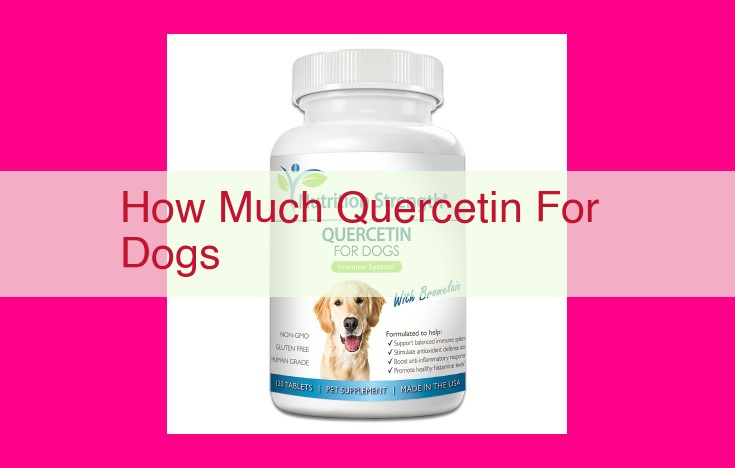Quercetin For Dogs: Relieve Allergies, Skin Issues, And Joint Pain Naturally

Quercetin, a plant-based antioxidant, offers potential health benefits for dogs. Studies suggest its anti-inflammatory and antioxidant properties may alleviate allergies, skin conditions, and joint pain. Recommended dosages vary depending on weight and condition, ranging from 25-200mg daily. However, consulting a veterinarian is crucial to determine the most appropriate dosage and monitor the dog’s health, as quercetin can interact with other medications and cause side effects. Responsible use under veterinary guidance ensures the safety and efficacy of quercetin for canine well-being.
Quercetin, a powerful plant-derived flavonoid, has captivated the world of pet health with its myriad of potential benefits for our beloved canine companions. This extraordinary compound has garnered significant attention due to its exceptional antioxidant and anti-inflammatory properties.
In this comprehensive blog post, we embark on a journey to unravel the safety and efficacy of quercetin for dogs. Together, we will delve into scientific studies, anecdotal evidence, and expert insights to illuminate the role of quercetin in promoting canine well-being.
Quercetin: An In-Depth Look at Its Molecular Makeup and Health Benefits
Quercetin, a flavonoid rich in health-promoting properties, has captured the attention of dog owners seeking natural supplements to enhance their canine companions’ well-being. This plant-based compound boasts a unique molecular structure that sets it apart from other flavonoids, conferring upon it exceptional antioxidant and anti-inflammatory capabilities.
Molecular Structure and Properties
Quercetin, with its polyphenolic structure, possesses several hydroxyl groups that allow it to scavenge free radicals, those destructive molecules that damage cells and contribute to aging. It also forms hydrogen bonds, which enhance its stability and facilitate interactions with biological molecules.
Antioxidant and Anti-inflammatory Properties
As an antioxidant, quercetin neutralizes free radicals, shielding cells from oxidative damage. Its anti-inflammatory properties further protect against cellular damage by suppressing the production of inflammatory mediators. This dual action makes quercetin a potent anti-aging agent and a potential therapeutic for various inflammatory conditions.
Other Potential Health Benefits
Preliminary studies suggest quercetin may also possess anti-cancer, antiviral, and antibacterial properties. It has been shown to inhibit the growth of cancer cells and enhance the immune system’s ability to fight infections. Additionally, quercetin has been linked to improved cognitive function in animal models, suggesting potential benefits for dogs with age-related cognitive decline.
Safety and Efficacy of Quercetin for Dogs
Can Quercetin Help Your Canine Companion?
Quercetin, a powerful plant pigment, has gained recognition for its potential health benefits in both humans and animals. But is it safe and effective for our beloved canine friends? Let’s delve into the scientific evidence and anecdotal experiences to unravel the truth about quercetin’s use in dogs.
Scientific Studies and Anecdotal Evidence
Research on quercetin’s effects on dogs has yielded promising results. A study published in the journal “Veterinary Sciences” found that quercetin supplementation significantly reduced inflammation and improved joint mobility in dogs with osteoarthritis. Another study in the “Journal of Veterinary Internal Medicine” showed that quercetin helped protect dogs from liver damage induced by certain toxins.
Beyond scientific studies, numerous dog owners have shared anecdotal evidence of quercetin’s positive impact on their pets’ health. From reducing allergies and skin issues to boosting immune function and overall well-being, quercetin has become a popular choice for many dog owners seeking natural remedies.
Potential Side Effects and Interactions
While quercetin is generally considered safe for dogs, it’s important to be aware of potential side effects. These may include gastrointestinal upset, such as vomiting or diarrhea, especially when taken in high doses. In rare cases, quercetin can interact with certain medications, including blood thinners and thyroid medications. Therefore, it’s crucial to consult your veterinarian before administering quercetin to your dog, especially if they are on any medications.
Recommended Dosages for Dogs
Determining the appropriate dosage of quercetin for your canine companion requires careful consideration of their weight, health condition, and potential drug interactions. It’s paramount to prioritize veterinary guidance before administering any supplements to ensure safety and efficacy.
For general health support, a typical dosage range is 5-10 mg of quercetin per kilogram of body weight daily. This can be administered in two or three divided doses throughout the day.
However, if your dog has specific health concerns, such as arthritis or allergies, the dosage may need to be adjusted accordingly. In these cases, consulting your veterinarian is essential to tailor the dosage specifically to your pet’s needs.
Remember, overdosing on quercetin can lead to adverse effects, including digestive upset and kidney damage. Therefore, always adhere to the recommended dosage guidelines and seek veterinary advice for any concerns.
Veterinary Supervision
Importance of Consulting a Veterinarian
Responsible dog owners understand that supplements, however natural they may seem, should not be administered without veterinary guidance. When it comes to quercetin, a plant pigment with promising health benefits, seeking professional advice is paramount.
Veterinarians are trained to assess your dog’s individual needs, health history, and current medications. They can determine the appropriate dosage, taking into account your dog’s weight and condition.
Ignoring veterinary guidance can have unintended consequences. Overdosing on quercetin can lead to side effects such as stomach upset, liver damage, and even kidney failure. Conversely, underdosing may render the supplement ineffective.
Veterinarian’s Role in Monitoring and Adjusting Dosages
Veterinarians also play a crucial role in monitoring your dog’s health while using quercetin. They can perform regular check-ups, assess the dog’s response to the supplement, and adjust dosages as needed.
Veterinarians are your partners in ensuring the safety and efficacy of any treatment plan for your furry friend. Their knowledge and expertise will help you navigate the use of quercetin responsibly.